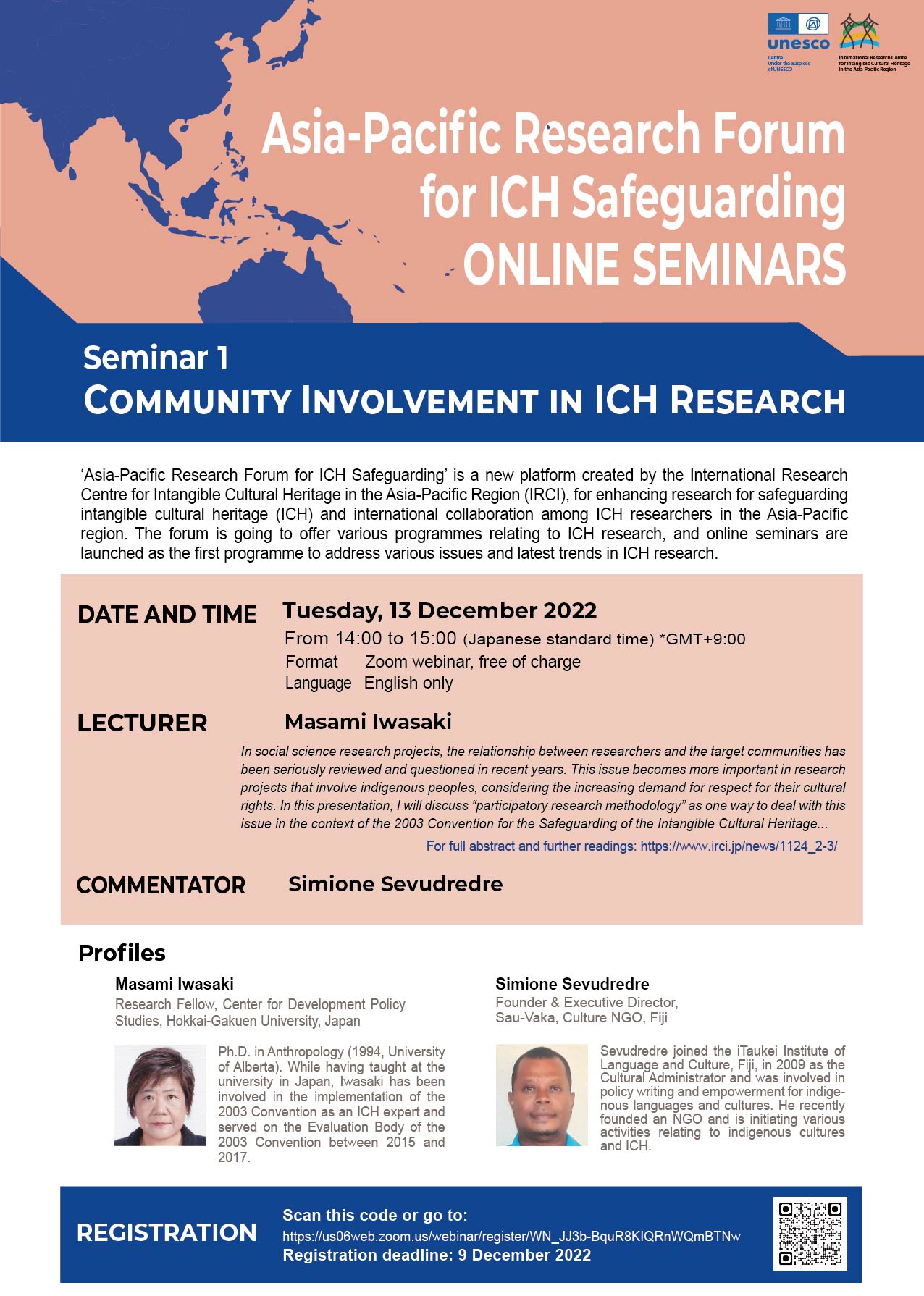EVENTS
25/11/2022
The first online seminar for safeguarding ICH in the Asia-Pacific region will be held on 13 December 2022
As the first programme offered by ‘Asia-Pacific Research Forum for ICH Safeguarding’, online seminars addressing various issues and the latest trends in ICH research in the Asia-Pacific region will be launched on 13 December 2022. Inviting Ms Masami Iwasaki as a lecturer, the first seminar will discuss the issues related to the community involvement in ICH research. Please see below for the first seminar information and registration.
Online Seminar 1
Community Involvement in ICH Research
Date and time:
Tuesday, 13 December 2022 14:00–15:00(JST)*GMT+9:00
Zoom Webinar (Registration is required. Please see below for registration.)
Language: English
Lecturer:
Masami Iwasaki (Research Fellow, Center for Development Policy Studies, Hokkai-Gakuen University, Japan)
Commentator:
Simione Sevudredre (Founder & Executive Director, Sau-Vaka, Culture NGO, Fiji)
For the abstract of the lecture and profiles, please see below.
Registration:
Registration (free of charge) is required for participating in the seminar.
This seminar is open to the public, and anyone interested in the topic is welcome to join. Please register from:
https://us06web.zoom.us/webinar/register/WN_JJ3b-BquR8KIQRnWQmBTNw
(Registration deadline: 9 December 2022)
Please contact IRCI if you have difficulties registering online.
*The Forum is established under IRCI’s research project ‘Creation of the Asia-Pacific Regional Hub of Research for the Safeguarding of ICH (FY 2022–2026)’.
Contact:
IRCI Secretariat
TEL:+81-72-275-8050
FAX:+81-72-275-8151
E-mail: irci@nich.go.jp
Community Involvement in ICH Research
Abstract by Masami Iwasaki
In social science research projects, the relationship between researchers and the target communities has been seriously reviewed and questioned in recent years. This issue becomes more important in research projects that involve indigenous peoples, considering the increasing demand for respect for their cultural rights. In this presentation, I will discuss “participatory research methodology” as one way to deal with this issue in the context of the 2003 Convention for the Safeguarding of the Intangible Cultural Heritage.
The Convention establishes that ICH belongs to the community, serving as an indispensable part of the community identity. Furthermore, Article 15 states that safeguarding ICH should be carried out with the “widest possible participation of communities, groups, and, where appropriate, individuals”. It is mandatory to put it into practice in every step in implementing the Convention, which includes conducting research on ICH.
I will introduce my experience of conducting a case study on traditional food in the Ainu community as a part of the international joint research project, organized by the Center for Indigenous Peoples’ Nutrition and Environment in Canada. In this international research project, case studies in 12 indigenous communities in different parts of the world were conducted, using the “participatory research methodology”.
The core of the “participatory research methodology” is the relationship between a researcher, who represents the research group and a community leader who represents the community concerned. They form an equal partnership, sharing responsibility and benefit of the research. Prior to the research, they discuss and agree on various conditions such as the purpose of the research, research methodology, a need for free, informed consent from the informants, etc. They, then formalize this as a signed agreement, ensuring respect and consideration to each other. This presentation provides an example of how the community can be effectively involved in the ICH research.
Further readings:
Iwasaki-Goodman, M., Ishii, S., & Kaizawa, T. (2009). Traditional food systems of Indigenous Peoples: the Ainu in the Saru River Region, Japan. In Food and Agriculture Organization of the United Nations & Centre for Indigenous Peoples’ Nutrition and Environment (2009), Indigenous Peoples’ food systems: the many dimensions of culture, diversity and environment for nutrition and health (pp. 139–157). https://www.fao.org/3/i0370e/i0370e00.pdf
Iwasaki-Goodman, M. (2013). Tasty tonoto and not-so-tasty tonoto: fostering traditional food culture among the Ainu people in the Saru River region, Japan. In Food and Agriculture Organization of the United Nations & Centre for Indigenous Peoples’ Nutrition and Environment (2013), Indigenous Peoples’ food systems & well-being: interventions &policies for healthy communities (pp. 221–233). https://www.fao.org/3/i3144e/i3144e.pdf
Iwasaki-Goodman, M. (2017). Transmitting Ainu traditional food knowledge from mothers to their daughters. Maternal & Child Nutrition, 13(S3), Article e12555. https://doi.org/10.1111/mcn.12555
World Health Organization. (2003). Indigenous Peoples & Participatory Health Research. https://www.mcgill.ca/cine/files/cine/partreresearch_english.pdf
Iwasaki-Goodman, M., & Nomoto, M. (2001). Revitalizing the Relationship between Ainu and Salmon: Salmon Rituals in the Present. Senri Ethnological Studies, 59, 27-46. http://doi.org/10.15021/00002785
Iwasaki-Goodman, M. (2005). Resource Management for the Next Generation: Co-Management of Fishery Resources in the Western Canadian Arctic Region. Senri Ethnological Studies, 67, 101-120. http://doi.org/10.15021/00002664
Brief profiles
Masami Iwasaki (Research Fellow, Center for Development Policy Studies, Hokkai-Gakuen University, Japan)
Masami Iwasaki received a Ph.D. in Anthropology from the University of Alberta, Canada in 1994, and has taught Anthropology at Hokkai-Gakuen University, Sapporo, Japan. She has been interested in the use and management of marine resources by both indigenous and non-indigenous coastal people in Japan and Canada. She also conducted research on how the decisions made by the international management organizations affects the life of coastal communities. For the last ten and some years, she has been involved in the implementation of the 2003 Convention as an ICH expert and served on the Evaluation Body of the 2003 Convention between 2015 and 2017.
Simione Sevudredre (Founder & Executive Director, Sau-Vaka, Culture NGO, Fiji)
Simione Sevudredre joined the iTaukei Institute of Language and Culture, Ministry iTaukei Affairs, Fiji in 2009. Since then, serving as the Cultural Administrator, he had been involved in policy writing and empowerment for indigenous languages and culture, as well as designed various research and specific programmes including seminars and community packages. He recently founded a new NGO and is initiating various activities such as the advocacy of indigenous parallel of Women & Children’s Rights and the research of indigenous culture and knowledge for DRR and relocation.
- ARCHIVE
- CATEGORY
- Research Data Collection
- Creation of Research Forum
- SDGs
- Climate change
- Natural hazards
- COVID-19 Pandemic
- Endangered ICH
- Post-conflict
- Legal systems
- Documentation
- Conferences/Meetings
- Seminars
- Symposiums/Forums
- Workshop/Working sessions
- Field research
- Information
- Visits
- Publications
- YouTube
- C2Centre
- UNESCO
- Cooperation-with-Sakai-city
- Governing Board Meetings
- Others




